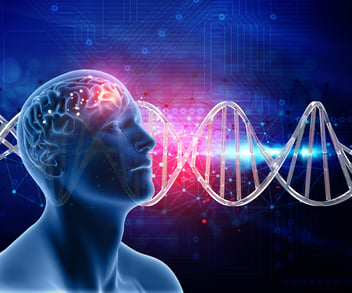My Moody Immunity
- Home
- Blog

ARE DEPRESSION, ANXIETY, BIPOLAR DISORDER, OCD AND PTSD IMMUNE SYSTEM DISORDERS?
Intelligent design, as one sees it from a scientific point of view, seems to be quite real. This is a very special universe: it’s remarkable that it came out just this way. If the laws of physics weren’t just the way they are, we couldn’t be here at all. The sun couldn’t be there, the laws of gravity and nuclear laws and magnetic theory, quantum mechanics, and so on have to be just the way they are for us to be here.
- Charles Townes, Nobel Laureate in Physics
My Dear Reader, do you ever contemplate how human life is possible in what appears to be a cold and indifferent Universe? What if the fundamental properties of this Universe aren’t as random as they seem—what if, in fact, they point toward the emergence and evolution of living, breathing beings like us? Consider, for example: if the big bang had been one-part-in-a billion more powerful, it would have expanded the universe too fast for the galaxies to form and for life to begin. If the strong nuclear force (the force that binds together the protons and neutrons of the 70 trillion atoms inside each of our human cells), were decreased by just two percent, atomic nuclei wouldn’t hold together and they (and our cells) would fly apart. And if these protons or neutrons were even 0.2% lighter or heavier, there would be no atoms at all! If the gravitational force were decreased even slightly, stars (including our sun) would not ignite, and there would be no energy transferred to planets like earth to enable life. Finally, four of the five most abundant atoms in the universe—hydrogen, carbon, oxygen and nitrogen—make up over 96% of your body weight. This is not because life evolved to use the most common atoms, but rather that the chemical reactions between them represent the only chemistry we know of that makes life possible. These are just a few of more than 200 physical parameters within the solar system and universe that so precisely point to life they have become a defense of intelligent design.
These scientific discoveries only add to my sense of awe and wonder about life and our place in the Universe. While the properties of the Universe may set life in motion, our very own bodies have adapted intricate mechanisms to sustain that life force. And as we are now discovering, these same mechanisms play a pivotal role in sustaining our mental health, too.
The Wonders of Your Immune System
As life has evolved on earth over the past 3.5 billion years, over 8.7 million living species and organisms have come into being—and each has developed unique defense systems to safeguard the life they contain. One such defense mechanism is the immune system which, if functioning properly, will protect creatures like us from environmental toxins, bacteria, and viruses. Indeed, an acute immune response is necessary for our survival: it enhances our ability to fight off those viruses and bacteria and helps us repair damaged tissues in our bodies.
Root Cause Analysis of “Moody Immunity” in Our Mental Health Ecosystem
Our immune system activates when it detects a threat in our bodies. We humans rely on this activation to survive—otherwise, we would have no way to fight against the microscopic threats we regularly face. Problems can arise when our system doesn’t activate—but there is equal danger in this system failing to turn itself off once the danger has passed. In fact, chronic activation of the immune system can lead to serious problems, including unremitting emotional distress.
The reason for chronic activation are complex, but they begin with a simple fact: much of our biological processing, including our immune system processing, evolved to fit a very different world than we live in now. Over billions of years, our 25,000 genes adapted to meet the needs of a hunter-gatherer way of life.
In the hunter gatherer world, the traumas our distant ancestors faced were largely immediate and short-lived – for example, running from a predator, surviving an acute infection, eating a plant that contained a toxin. These acute threats would boost immune system response. In our modern world, immune system “micro-traumas” have become a part of our daily lives, and may include poor diet, lack of movement, environmental toxins, lack of sleep, and chronic unremitting stress.
What happens to our mental health when our immune system is not functioning properly, and we develop what is known as chronic systemic inflammation? As it turns out, your immune system may hold an important key to answering that question.
Is Your Immune System to Blame For Your Psychological Distress?
What if I were to tell you that unremitting symptoms of depression, anxiety, PTSD, OCD, autism, or brain fog come from this prolonged activation of your immune system? What if I were to go on to tell you that those immune system mechanisms, gone awry, are similar to those that cause the suffering of so many COVID long-haulers? You first thought might be, “A psychiatrist has no business writing about the immune system—he should stick with what he was trained in!”
But here’s the thing: scientific studies show that 21-42% of patients hospitalized with psychiatric conditions show evidence of systemic inflammation caused by an overactive immune system response. Recent evidence also demonstrates that there is a prominent role of inflammation in mood disorders.
And functional imaging studies of the brains of depressed patients who suffer from a chronic inability to experience pleasure and reward, known to us as “anhedonia,” demonstrate that inflammation negatively affects dopamine circuits in the brain associated with pleasurable experiences.
The evidence also shows that immune system alterations began before the onset of the mood disorder!
Elevated levels of molecules in the bloodstream that promote inflammation (called “pro-inflammatory cytokines”) have been reported in bipolar disorder as well as other mood disorders. And here is perhaps an even more surprising finding: people with autoimmune diseases have an increased risk of developing bipolar disorder itself! These immune system problems are associated with changes in the brain, including altered metabolism of brain cells (which in turn negatively affect an individual’s ability to produce energy to power the thinking, feeling, and behaviors that help us care for others and ourselves) as well as signs of “micro-traumas” to the myelin molecules that line many brain cells (myelin is like insulation surrounding an electric wire) which can predispose to “short circuiting” of important brain circuits and processes.
How does this happen?
Brain Microglia: Unsung Heroes, and Vindictive Villains
Micro-what? By now, if you have followed some of these blogs, or read articles or books about your brain, you would recognize the word “neurons”—the 100 billion cells in the brain that communicate with one another across 10,000 trillion synapses. What you may not be aware of is that in your brain there are 100 billion other types of cells called “glial cells” comprised of three types. One type, “astrocytes,” have important roles in nourishing and supporting neurons and synapses, and stabilizing the blood-brain barrier (a good “BBB” keeps bad things out of your brain). Think of them as like the parent who cooked supper for you, read you bedtime stories, and tucked you into bed at night—they are that important. A second type of cell is the “oligodendrocyte,” that manufactures that “myelin insulation” to protect the circuits in the brain. It also helps to regulate the immune system in the brain. The third type of glial cells are the “microglia”. These are the immune system cells in the brain, and they are constantly moving and surveying the area for threats such as infections, toxins, and other sources of damage to neurons. The become heroes when their tiny “arms” sweep viruses, bacteria, and toxic molecules and gobble them up, destroying them to protect our precious brains. What is their role in mood disorders? This is where they can become villainous.
In the brain, microglia regulate inflammatory response and manufacture those pro-inflammatory cytokines I mentioned above. Imaging studies of the functioning brain not only show brain inflammation, but also found that in patients suffering from bipolar disorder, the microglia were highly activated (think “pumped up and ready to fight”) in the region of the brain known as the hippocampus, which was associated with damage to the neurons in that most important region. The hippocampus is an important site of decision making, and storing away new memories for learning and future use.
Circulating Cytokine Storms Aren’t Just in COVID
Outside the brain, and present in many mood disorders (as is the case in acute COVID and COVID “long-haulers”), there is an overabundance of molecules in the bloodstream that cause inflammation. When in the right types and numbers, these inflammatory cytokines can be constructive to our health and circulate to regulate the behavior of many human cells. They can control and promote the growth of cells, help them migrate where they are supposed to travel, and can even help damaged cells die to make room for new and healthier cells. But when there are too many inflammatory cytokines, or they circulate for too long, they can begin to damage our cells, including our brain cells, bringing stormy emotions and brain fog in their wake. The end result? These cytokines can negatively affect our moods, influence our behaviors, and weaken our ability to focus, think, and remember by altering brain neurotransmitter levels (particularly reducing dopamine, the “feel good neurotransmitter”), altering hormone levels, activating glutamate (known as the “excitotoxic neurotransmitter”), and impairing the ability to grow new brain cells and new connections between them.
Can a Genetic Test Help Assess My Risk of Moody Immunity?
My dear reader, the Universe is an incredibly elegant and complex place, and we are only just beginning to scratch the surface of the wonders it holds. Similarly, your own biological being contains infinite intricacies—but we are learning more about these intricacies every single day.
If you are suffering from chronic, unremitting emotional pain, it may be the result of genetic variations in your immune system, present within you since birth, that predispose you to the type of brain inflammation we describe above. A number of these variants can be determined by a new genetic test, one that tests over 700 genes, many of which relate to our mental wellness. The great news is that all of these genes, once uncovered, can be influenced toward better mental health. As the architect of your own mental wellness, this genetic test can help create a blueprint to build better mental health. This test has truly “cosmic” implications—and in our next blog, we will introduce you to all the wonders it may reveal. Stay tuned!
.png?width=144&height=144&name=Untitled%20design%20(34).png)



